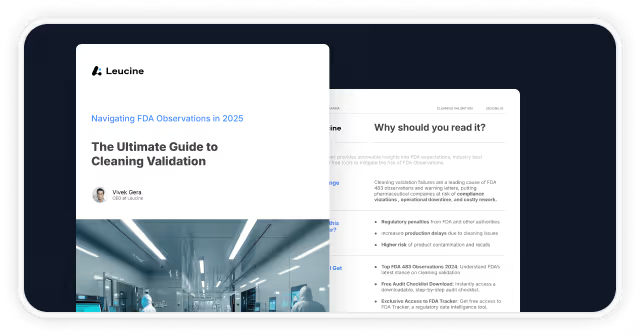QMS Guidelines: Ensuring Excellence in Pharmaceutical Manufacturing

In the pharmaceutical industry, Quality Management Systems (QMS) are the backbone of ensuring product quality, regulatory compliance, and patient safety. Adherence to QMS guidelines like ISO 13485:2016 and ICH Q10 is crucial for a pharmaceutical company to ensure compliance and maintain high product quality. Maintaining quality standards in managing outsourced activities and materials is equally important, as effective management practices like supplier selection and performance monitoring are essential to meet these benchmarks. Implementing an effective QMS is not just a regulatory requirement but a strategic advantage for pharma leaders aiming for operational excellence, market leadership, and long-term growth. This blog outlines the key QMS guidelines that govern pharmaceutical manufacturing—highlighting their significance, regulatory relevance, and strategic application for executive decision-makers.
Key QMS Guidelines in the Pharmaceutical Industry
1. ICH Q10: Pharmaceutical Quality System
The ICH Q10 guideline provides a harmonized model for a pharmaceutical quality system across different regulatory environments. It is integral to pharmaceutical quality management systems, ensuring compliance with essential industry regulations like cGMP, ISO standards, and ICH Q10 guidance. It forms the foundation of modern QMS implementation. The ICH Q10 guideline serves as a comprehensive model for an effective pharmaceutical quality system, enhancing product quality and fostering a customer-centric culture within operations.
Core Elements:
- Management Responsibility – Demonstrates leadership commitment to quality culture.
- Continual Improvement – Drives process enhancements and product performance.
- Corrective and Preventive Action (CAPA) – Resolves systemic issues with sustainable fixes.
- Change Management – Ensures structured control over process and product changes.
Recording quality events is crucial to ensure consistency and control within an organization.
2. ISO 9001:2015
Although not pharma-specific, ISO 9001:2015 serves as the global benchmark for QMS implementation. It is a globally recognized standard for quality management systems, ensuring high-quality standards across various industries. It emphasizes risk-based thinking, leadership accountability, and a strong customer focus—principles crucial to pharmaceutical manufacturing. Adapting to changing customer expectations is also vital for maintaining market share, requiring continuous improvement to enhance customer satisfaction and foster loyalty.
3. ISO 13485:2016
ISO 13485:2016 addresses QMS requirements specifically for medical devices and combination products. For pharmaceutical manufacturers involved in device manufacturing (e.g., prefilled syringes), adherence is essential. Aligning with applicable regulations enforced by agencies like the FDA and EMA is crucial to ensure compliance and market access.
4. Good Manufacturing Practices (GMP)
GMP guidelines are the operational heart of QMS in pharma. They ensure drug products are manufactured consistently through a well-defined manufacturing process. Integrating quality policies into the QMS framework is essential for enhancing efficiency and compliance. Adhering to current good manufacturing practices (cGMP) is crucial in the pharmaceutical industry to comply with regulatory standards set by the FDA and EMA, ensuring product integrity and avoiding penalties.
- EU GMP – Emphasizes a systematic approach to quality management, with risk-based inspections.
- FDA CFR Title 21 Parts 210 & 211 – Provides US-specific regulations for drug manufacturing, handling, and storage.
5. WHO GMP
Issued by the World Health Organization, these guidelines are critical for companies seeking WHO prequalification or participating in international procurement. Meeting strict regulatory requirements is essential for WHO prequalification, ensuring compliance with international standards. An effective Quality Management System (QMS) tailored for the pharma industry is crucial for meeting these requirements, enhancing quality management practices within pharmaceutical organizations.
Useful links: WHO GMP Guidelines
6. PIC/S GMP
The Pharmaceutical Inspection Co-operation Scheme (PIC/S) promotes global harmonization by providing aligned GMP standards and inspection procedures through effective QMS systems. Robust eQMS solutions are particularly important in the life sciences industry to ensure efficient data handling, compliance, and support for evolving standards like Pharma 4.0. These guidelines are crucial for pharmaceutical organizations seeking to meet international compliance standards and ensure product quality and patient safety.
Recent Changes in QMS Guidelines
Pharma executives must stay ahead of evolving guidelines to continuously improve their processes and ensure proactive compliance and market agility. It is crucial to align with applicable regulations to maintain compliance with agencies like the FDA and EMA. Recent changes in QMS guidelines are driving continuous improvement in the pharmaceutical industry by fostering a quality-centric environment that enhances product performance and meets regulatory standards. Here are key updates:
1. ICH Q12: Product Lifecycle Management
This complementary guideline to ICH Q10 facilitates efficient post-approval change management—reducing regulatory burden while maintaining product quality.
Managing quality throughout the entire product lifecycle is crucial to ensure compliance with regulatory standards and maintain product integrity from inception to market. A well-structured pharmaceutical QMS is essential for effective product lifecycle management. The critical elements of a QMS, such as continuous improvement, risk management, and adherence to standards like ISO 9001:2015, ensure product quality and compliance.
2. FDA’s Draft Guidance on Quality Metrics
The FDA’s initiative encourages manufacturers to track quality metrics like batch failure rates and CAPA effectiveness to predict risks and drive improvement. Tracking these quality metrics, including corrective and preventive actions, ensures that non-conformances and complaints are efficiently managed. Establishing clear quality objectives is crucial to align with regulatory requirements and ensure continual improvement. Quality control plays a crucial role in tracking these quality metrics, ensuring compliance with standards like PIC/S GMP and FDA regulations.
3. EU GMP Annex 1 (Revised 2022)
This critical update introduces advanced contamination control strategies, cleanroom classifications, and a risk-based approach to sterile manufacturing.
Efficient document management is crucial in ensuring compliance with these updates, as it streamlines quality management processes and supports regulatory adherence.
These advanced contamination control strategies are essential for ensuring the quality of finished pharmaceuticals, as they align with the regulatory framework set forth by FDA 21 CFR Part 211.
4. ISO 9001:2015 Transition
The transition from ISO 9001:2008 demands a stronger focus on process performance and customer-centric design of QMS.
During this transition, it is crucial to design QMS to meet both regulatory standards and client expectations. Additionally, meeting customer requirements is essential for compliance and operational efficiency.
Strategic Importance of QMS Guidelines for Pharma Leaders
Adhering to QMS guidelines goes beyond compliance. For pharma executives, it is a cornerstone for business continuity, product trust, investor confidence, and long-term success.
A pharmaceutical quality management system (QMS) is crucial in strategic decision-making for pharma leaders, ensuring compliance with industry standards such as ICH Q10 and cGMP. Conducting regular management reviews is essential for evaluating progress towards quality objectives and making data-driven decisions.
Key Benefits:
- Regulatory Readiness: Avoid costly recalls, warning letters, and import alerts.
- Product Excellence: Deliver safe, effective, and reliable medicines.
- Process Efficiency: Optimize operations with fewer deviations and reworks.
- Enterprise Growth: Accelerate approvals and expand into global markets.
- Risk Governance: Enable informed decisions through data-backed insights.
- Quality Assurance: Ensure product excellence and compliance through structured quality management systems.
- Knowledge Management: Capture and utilize critical information related to products and processes, facilitating informed decision-making.
- Centralized System: Manage quality procedures efficiently by integrating all relevant processes within a single platform, providing complete traceability.
The Importance of Adhering to QMS Guidelines
Adhering to QMS guidelines is essential for several reasons:
- Regulatory Compliance: Ensures compliance with local and international regulations, avoiding legal issues and penalties. Quality management principles are foundational in ensuring compliance with these regulations. Adhering to regulatory standards, such as FDA, ISO, and cGMP, is crucial for ensuring product quality and safety throughout the development and lifecycle of pharmaceutical products. Operating in a highly regulated industry, such as the pharmaceutical sector, presents challenges in adapting to market demands and maintaining agility due to stringent regulatory requirements. A robust Quality Management System (QMS) is essential to navigate these challenges effectively.
- Product Quality: Guarantees that products meet predefined quality standards, ensuring safety and efficacy.
- Operational Efficiency: Streamlines processes, reduces waste, and improves efficiency.
- Customer Satisfaction: Consistently high-quality products enhance customer trust and satisfaction.
- Risk Management: Identifies and mitigates risks associated with product quality and safety.
Quick Audit Readiness Checklist
To ensure your QMS is always inspection-ready, pharma leaders should validate the following essentials:
- Digital Audit Trails – Are all records traceable and timestamped?
- Document Control – Are SOPs and quality docs up-to-date?
- Training Records – Is team compliance training current?
- CAPA & Deviations – Are investigations closed on time?
- Change Control – Is every change risk-assessed and approved?
- Quality Management Software – Is effective quality management software in place to ensure audit readiness?
- Quality Systems – Are effective quality systems established to enhance product quality and ensure regulatory compliance?
- Supplier Management – Is there strict oversight and effective control over suppliers to mitigate risks and ensure compliance?
Ready to Modernize Your Quality Operations?
While QMS guidelines lay the foundation, execution is what sets high-performing pharma teams apart. Utilizing a QMS system is crucial for modernizing quality operations, as it enhances compliance, efficiency, and supply chain management. Recording quality events is essential to ensure consistency and control within an organization.
Leucine’s next-generation MES empowers manufacturers to:
- Execute batches with precision and traceability
- Eliminate manual errors and delays
- Stay audit-ready with real-time digital records
- Ensure compliance with FDA 21 CFR Part 11, EU GMP, and WHO GMP
Whether you’re a Chief Quality Officer or a CEO leading digital transformation, Leucine helps you stay compliant, efficient, and audit-ready—always.
Visit Leucine.io to learn more





























.png)
